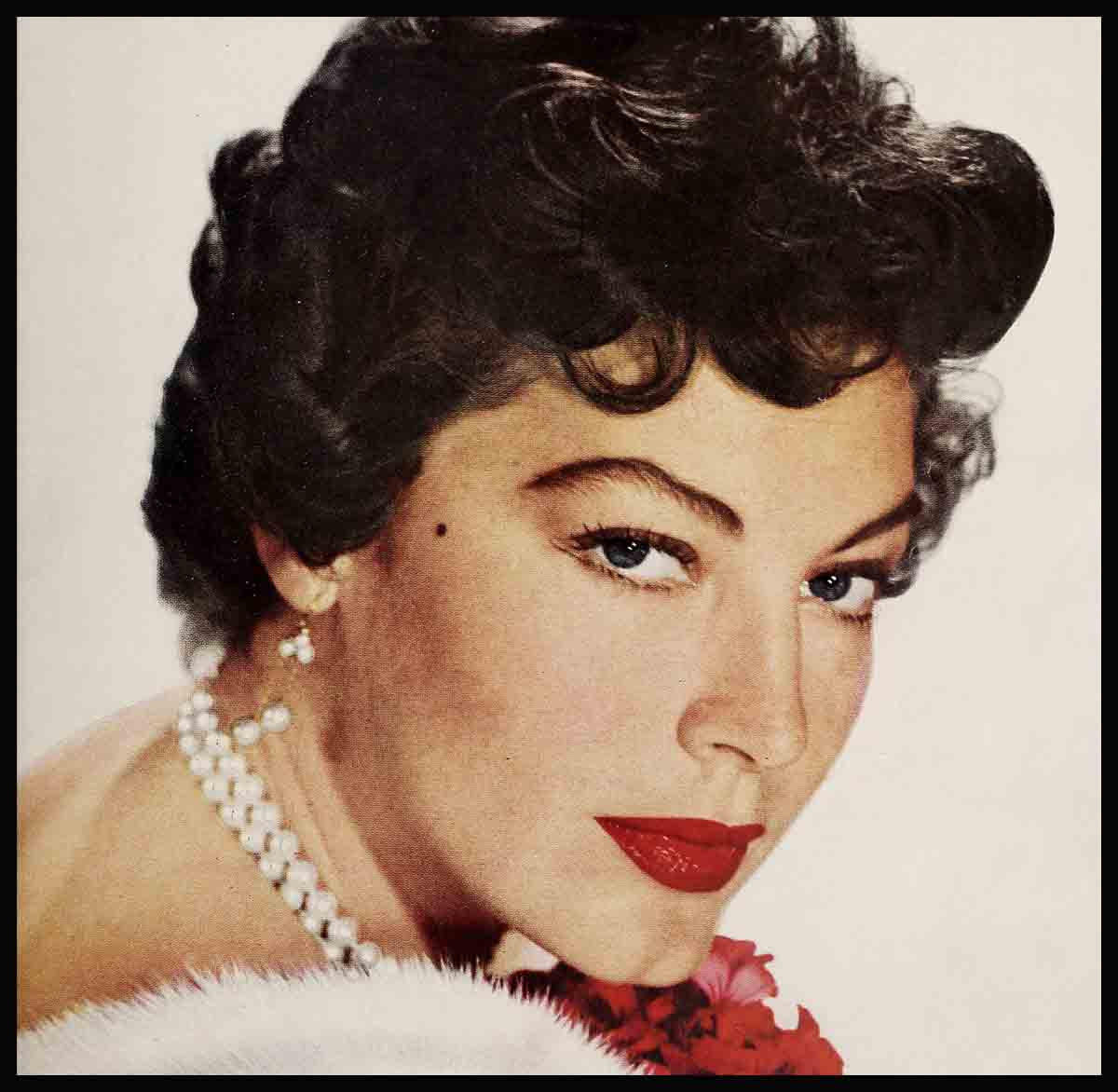
Ava Gardner Wants Out!
Ava Gardner has had it.
After spending 12 years, the springtime of her life, in the movie colony, the cat-eyed beauty from Grabtown, N. C., is ready to pull out.
“I want to leave Hollywood,” Ava confessed to me, “at least temporarily—and maybe even longer. Frank and I were talking only the other night. If we could spend a year in Europe, it’d be crazy. Honestly, darling, I’ve got nothing against this town, only it’s such a darn tough place. I mean to make a success of marriage.”
She leaned across the sofa to an end table, reached for a cigarette and lit it. Then, she opened the top collar button on the $12.95 grey broadcloth shirt she’d bought at Amelia Gray. She straightened out a fold in her grey flannel skirt, cost $18.95, exhaled a puff of smoke and continued talking.
“Today is our seventh anniversary, you know. Seven months. We were married on the seventh. I think I’ll put in a call to Chicago and talk to Frank. That’s what I mean about this town, doll, or maybe it’s just the business we’re in. You want to see your husband, and where is he? Playing the Chez Paree in Chicago. For nine months I’m not in a single picture. Then I get married and bop!—the studio’s gotta have me right away.
“Honestly, doll, ever since the boy and I got together we’ve been on the move. First you rent a house down at the beach that costs seven hundred a month. Then you rent a place like this, and it costs five hundred a month. Frank and I really don’t own any furniture, you know. A lot of the stuff here comes from his office. Just threw it in.
“What we need is a house of our own, a little security, somewhere to plant roots, and somehow I just don’t think this is the town for that. Cripes! What an army of snipers. What do they call that? Occupational hazard, I guess. The best thing I can think of, on the level, would be to live here for six months and live in the East for six. That’s it—here six, there six. Right now I’d like to be there.”
She mashed her cigarette. “Cripes! I’m hungry. Don’t you want something to eat?” she asked. I shook my head. She got up and said, “Excuse me, honey. I’m starvin’.”
She called Maria, the housekeeper, and politely asked for a coke and a lettuce and tomato sandwich toasted. When she returned she tried to crack a pecan with a single-blade nutcracker. She failed. “Gosh!” she exclaimed. “What a hokey nutcracker.”
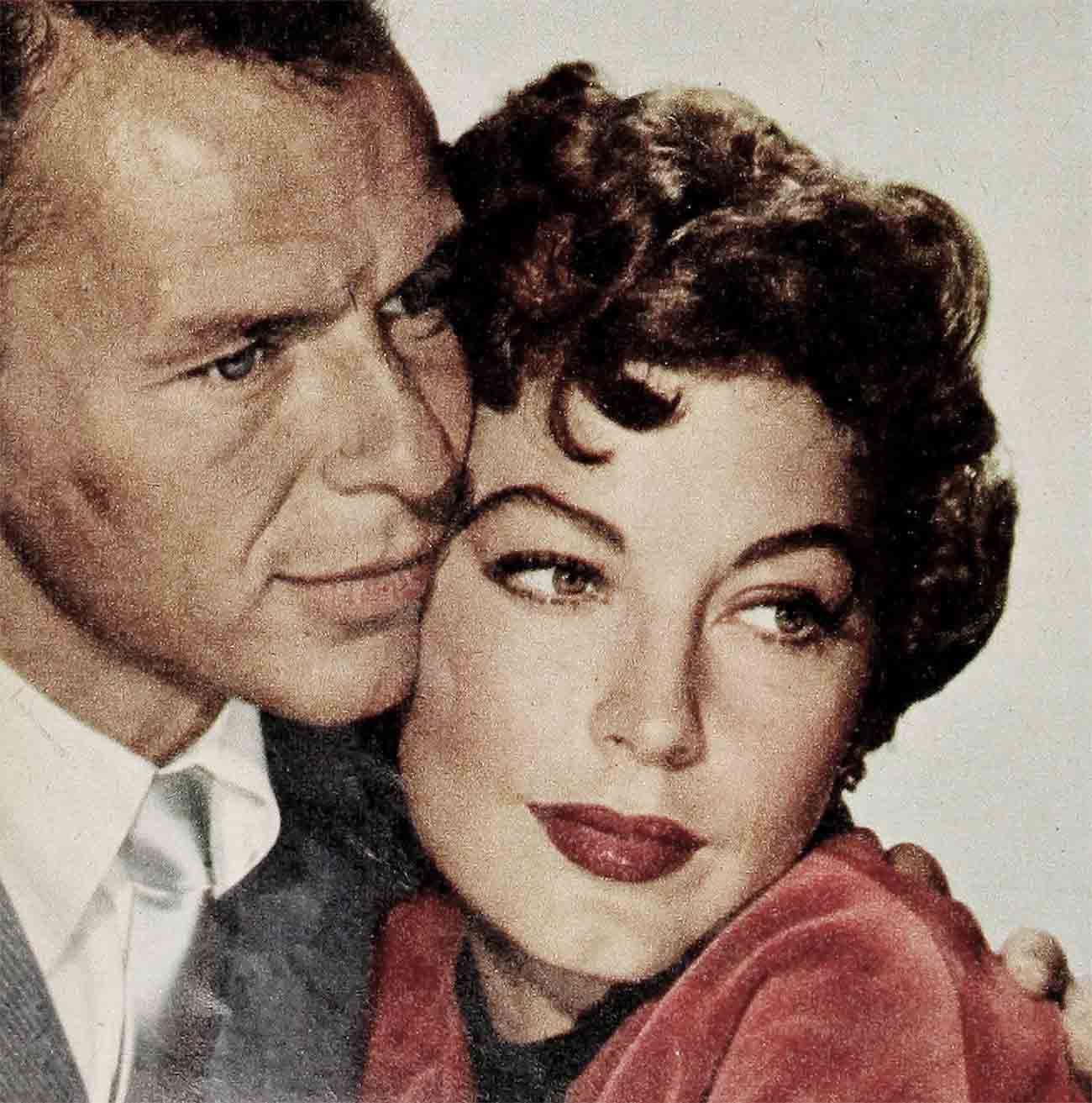
“When did you dye your hair blonde?” I asked.
“How do you like it, darling?”
I crinkled my nose.
“It looks awful now,” she explained quickly, “because it’s yellow but wait till you see it tonight. Tonight the girl’ll put some blue in it and silver it up. It’ll look nice. Really will. I dye my hair about once every two years. I don’t know why. For the change, I guess. Honestly, doll, it doesn’t look half bad. I mean, Frank doesn’t mind.”
Maria brought the coke and sandwich. Ava bit into the toast. She weighs 123 lbs. end looks thinner than she ordinarily does, She hasn’t been feeling too well lately, she admitted, in fact had been laid up in the hospital for a few days.
“How’s your mental condition?” I asked.
“Whattaya mean, mental condition?”
“Your outlook on things.”
“What things?” Ava Gardner asked.
“Your suspension, Frank, your plans for the future, those things.”
She thought for a moment, her eyes growing meditative as twilight. “I wish we had the Palm Springs house in Los Angeles,” she said presently. “That’s a great house. About the future, who knows? We don’t have any definite plans. How can we? Who knows what comes up in this business? That’s what I’ve been trying to tell you. A girl marries a stockbroker or a bookkeeper, her life is set. She knows the score. Marry some guy in show business and it’s rough. Today he’s in Chicago. Then he’s hitting St. Louis. When he comes home, the studio wants you to take a flying leap to Mexico.
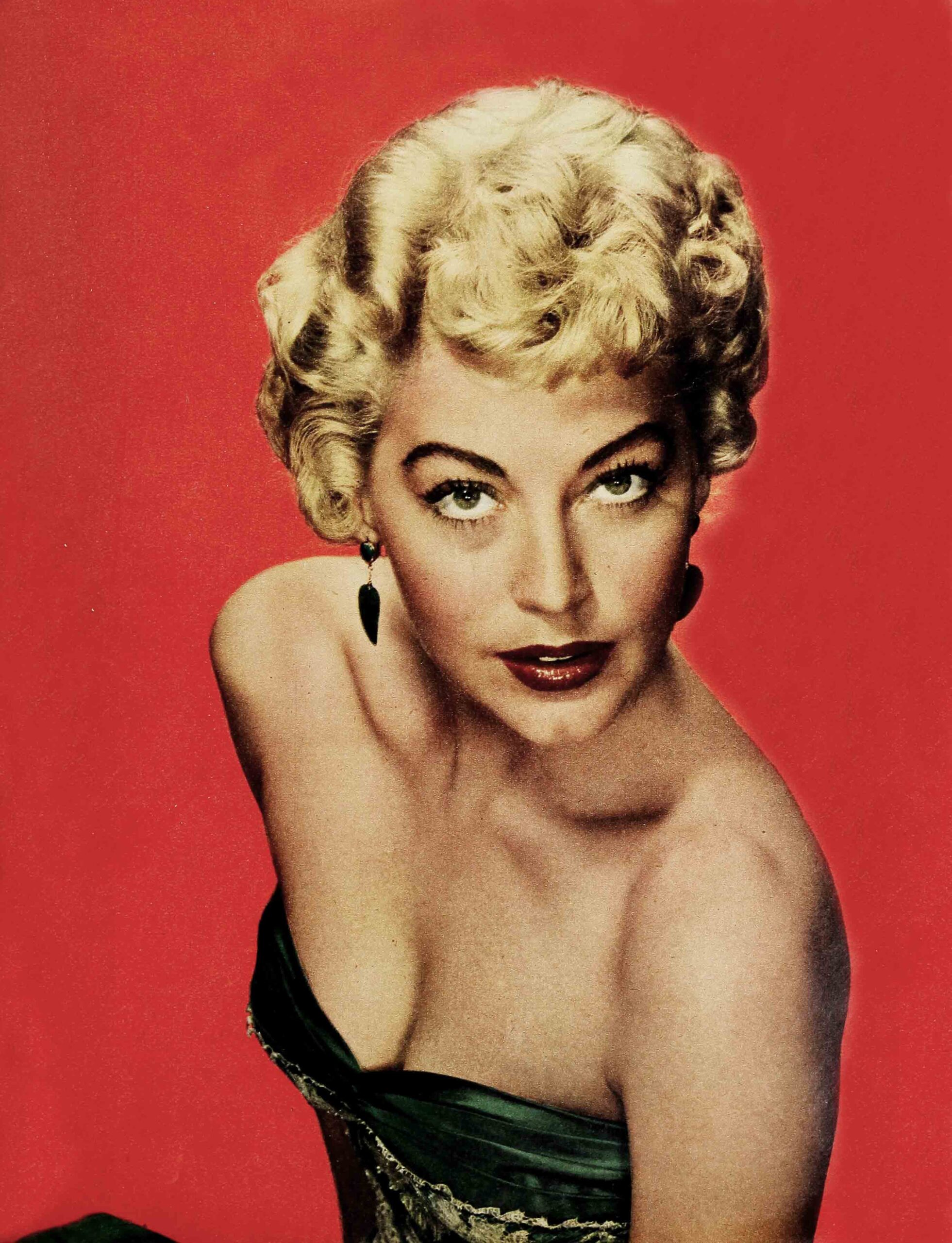
“I know what you’re going to say. You always say it. Why don’t I quit and have some kids and settle down? I’d settle for that. Funny thing, we were in this restaurant the other night. A handwriting analyst—some hokey dame came over. I scribbled a few words. “You’re going to have twins,’ she told me. ‘Eventually two boys and a girl.’ She also told me I’m going to be pregnant in five months. Frank told her we’d work on it. I can’t have twins. Least, I don’t think so. No twins in Frank’s family. None in mine. But two girls and a boy, that’d be great. I mean two boys and a girl.”
“Frank makes a good father,” I said.
Ava smiled. “Out of this world. We had the kids down at the desert before we went to Honolulu, and Frank was wonderful with them. It was the first time for me. Their mother’s done a great job. I sure want to see more of them. They’re just adorable, you know.”
The housekeeper let Ava’s dog, Rags, into the house and tied his leash to the coffee table.
Ava picked the dog up and hugged him.
“He’s a Welsh Corgi,” she explained. Then to the dog, “Aren’t you, Rags?” She put him down, explaining that she’d first met the dog in England two years ago, thinking he was a lovable little mongrel. An Englishman told her that Rags was no mongrel at all, that her mistake was a frequent one since there were less than 150 such dogs in America. “Anyway, Frank had this little creature flown over for my 28th birthday. My sister Babs has one named Shannon. They’re just wonderful. Excuse me, honey. That’s the phone.”
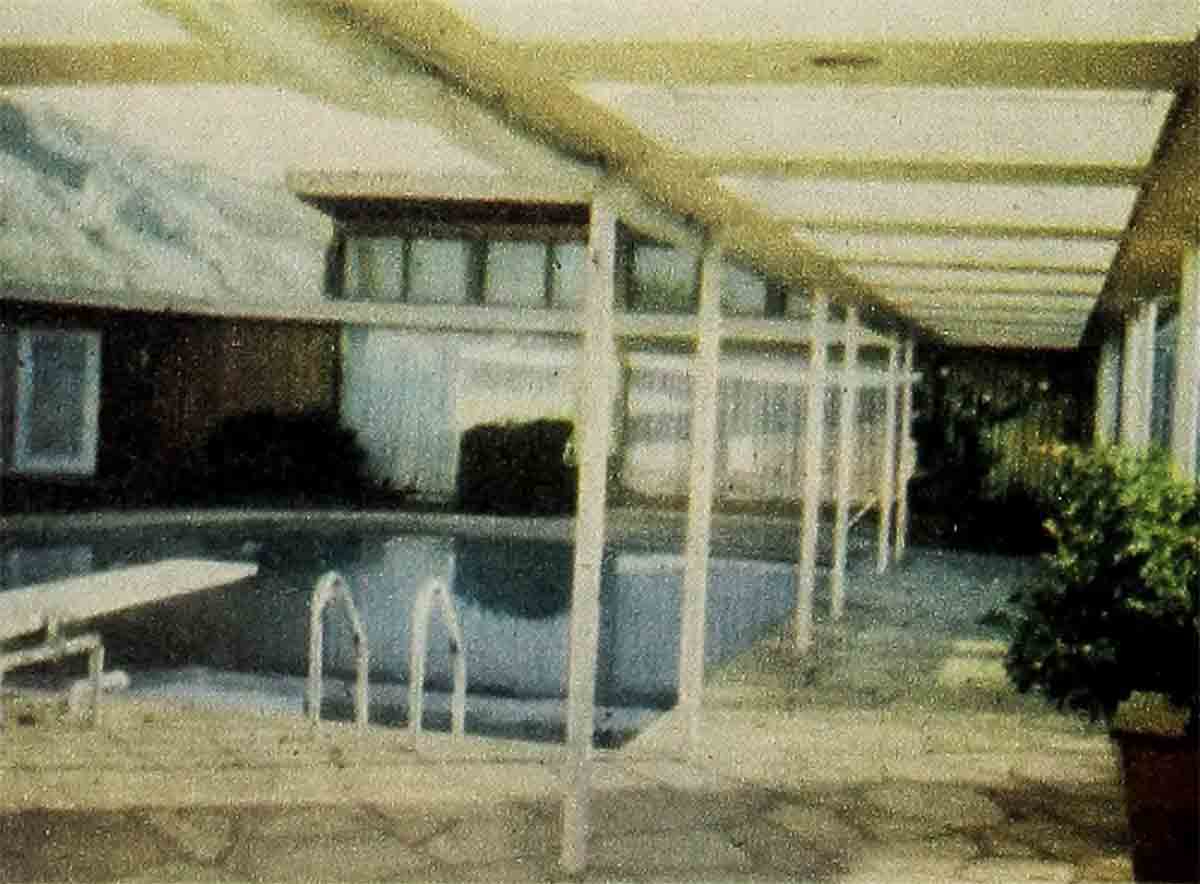
While Ava was talking to her agent, I looked around this new house she and Frank rent furnished at $500 a month.
It’s a small house located in a fashionable section of Beverly Hills on a canyon road. It has five rooms and one for the maid. The largest room is the bedroom. Ava and Frank sleep in a tremendous double bed. On the night table at the left, Ava’s side of the bed, rests a small portrait of Frank, showing him a 17-year-old youngster in Hoboken. A wedding picture of Ava and Frank stands on one dresser and portraits of Ava’s various nephews and nieces on another. The room also contains a radio, a record-player especially built for Frank, and a television set.
One of the closets in the foyer beside the bedroom was opened. It contained nothing but Ava’s shoes. I counted 35 pairs. Most of them were plain black high-heeled pumps.
I returned to the living room, a modern rectangle done in light green with grey carpeting. A portrait of Ava painted by her good friend, Paul Clemens, hung on the wall over the baby grand piano. Portraits by Clemens hang in many Hollywood homes.
Ava came back from her phone call. “Sure you’re not hungry, sweetie?”
I said, “No.”
“When I’m hungry,” she said, “I eat like a pig. Honest!”
“I thought of some questions to ask,” I said, “while you were on the phone. I’d like you to level on them.”
She said she would.
“A year ago, I began, “when I asked you if you were contemplating a marriage with Frank—or maybe it was more than a year ago, you said, ‘Do you think I’m crazy? Why should I marry him? He’s in show business. I’ve already been married to two guys in this racket. Look what happened.’ Now tell me, Ava, what made you change your mind?”
She laughed to herself. “I still say the same thing. Honest, doll. A girl’s got to be crazy to marry a guy in show business. Why’d I do it? I can’t explain it in terms of logic. In fact, logic’s got nothing to do with it. With me it’s pure emotion. I fall in love with a guy, and I’m hooked. Lana’s the same way. We’re a pair of. suckers for love. I always will be.
“In all of my marriages, it’s been the same bit. When I told friends Mickey and I were going to be married, they came to me and said, ‘Listen, Ava. Better suicide. You don’t know what you’re doing.’ With Artie the same routine. When I started going with Frank, more warnings.
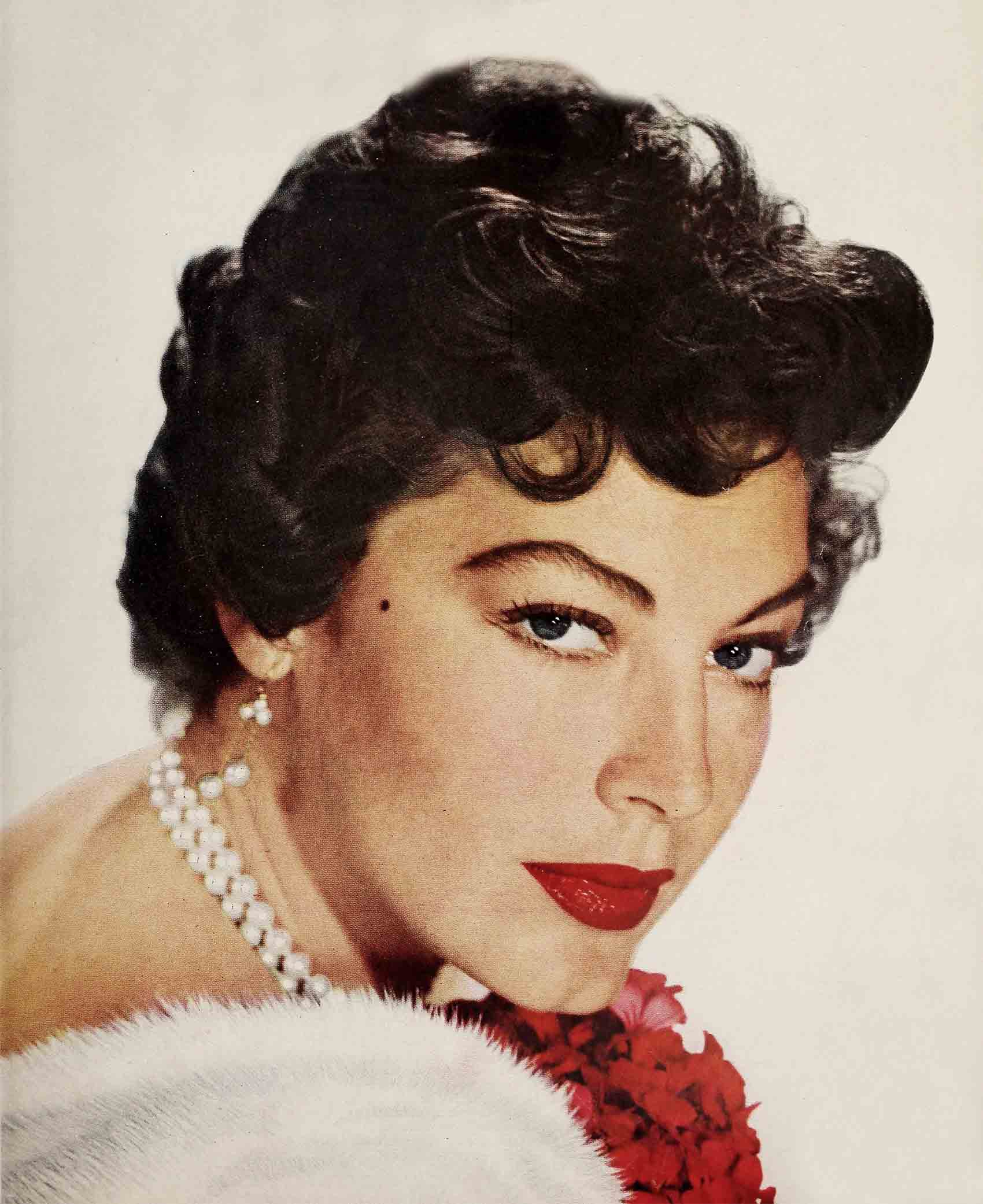
“Here’s the way I feel about it. If things blow up, I’m the one to suffer. I’m the fall guy. I’m the one who’s got to take the rap. But I’m funny about marriage. To the best thing, the only thing, is a wedding ceremony. I feel I’m entitled to make my own mistakes and pay for them.
“I fell in love with Frank. It wasn’t intentional. I’d met him ten years ago when he was singing with Tommy Dorsey at the Palladium. I’d seen him around the studio. It was nothing. Just hello and goodbye. Two years ago we met and it started getting serious. Can I help it if I don’t have sense enough to run away from love? The result is that I’ve never been happier in my life. I think the same goes for Frank.”
The phone rang again. Maria came into the living room. “Perdoname, Senora,” she said, speaking to Ava in Spanish. “Su doctor. El telefono.”
Ava jumped up. “Back in a minute, sweetie.”
She was back in less. “Shoot,” she said.
I fired a second question. “What goes with you and these constant studio suspensions?”
Ava lit another cigarette. For the first time her good humor seemed to evaporate. “All I’m going to say about that, doll, is this: my contract expires in December next year . . . Enough?”
I nodded. It’s no secret in Hollywood that Ava would like to terminate her MGM contract as quickly as possible. Hollywood’s most beautiful actress and Hollywood’s largest studio just don’t happen to see eye to eye on story values.
Ava has developed into an actress of considerable talent and surprisingly fine literary taste. She has turned down several roles offered to her. The studio sees no point in paying her for not working so that a good portion of her time has been spent on suspension.
Once Ava’s Metro contract expires, she intends to leave Hollywood, circumstances permitting, for a substantial period.
She has never been a particularly ambitious girl. Neither does she covet fame or money. What she is looking for is emotional security and personal happiness. To have these, she feels strongly that she must be with her husband. She prefers to spend at least six months of the year with him away from Hollywood. In the movie colony she has the recurrent feeling that she is the cynosure of all eyes, that everyone is waiting for her marriage to founder, that thousands of It-old-you-so wiseguys build up every little quibble into a cause célébre.
Hollywood has given Ava some money—not much but more than she ever had before—and a good deal of notoriety, but she has been happiest away from Hollywood when she’s had Frank at her side.
Since Ava’s suspension Frank has been the sole source of family income. Frank makes good money on the personal appearance circuit, but it’s hard work, and he has to give away a good portion of his earnings for the support of ex-wife Nancy and his three children.
If Ava could only obtain her release from MGM, she feels she could go to Europe and make a picture over there for at least $50,000 per film. Metro gets $65,000 and up when they loan her out: Ava could also remain in Hollywood and make films on a free lance basis which would again supply her with the wherewithal to travel.
Ava loves the house she and Frank own in Palm Springs, but the desert is no place for a young couple during the hot months. Besides, Ava is beginning to think that Palm Springs is too close to Hollywood for the type of privacy she craves.
“I never have been very good,’ Ava says, things. All I know is that I’ve got to get away from this town for a while. I need a change.”
“Is that why you’ve been dyeing your hair?” I asked. “A sort of substitute?”
Ava Lavinia grinned. “It’s sure going to be funny,” she said. “I’ve posed for different magazine photographers as a brunette, an ordinary blonde, and a platinum blonde. By the time the magazines come out, I’m going to be a redhead.”
THE END
—BY THELMA MC GILL
(Ava will soon be seen in MGM’s Sombrero)
It is a quote. MODERN SCREEN MAGAZINE SEPTEMBER 1952





No Comments